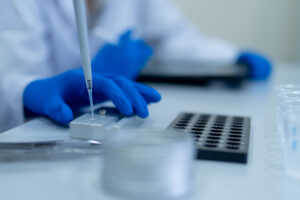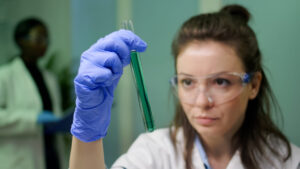Diagnosing a rare disease can be a complex process.
It is not possible without the support of genetic experts, including genetic counselors and geneticists. When it comes to understanding how to diagnose a rare disease, genetic counseling and genetic testing, are essential services.
Diagnosing a rare disease: genetic counseling
We can not understand how to diagnose a rare disease without fully understanding the role and importance of genetic counseling.
Genetic counseling is led by a genetic counselor, a medical professional with training in counseling, and a background in genetics as well.
Genetic counseling plays an essential role in how a rare disease is diagnosed by providing the following support services:
- Information, education, and awareness about rare diseases, including their causes and symptoms. The more awareness and education there is about rare diseases, the more we can improve the accuracy of the diagnosis process. The more information people have, the more we can better understand symptoms, and identify those who might require genetic screening.
- Recommendations for genetic testing options, based on an individual’s or family’s family medical history, and symptoms. The more accurate these recommendations are, the more accurate a potential diagnosis will be. The understanding a genetic counselor can take away from a family’s medical history and/or symptoms is invaluable for helping families receive timely and accurate diagnoses of rare diseases. A genetic counselor’s expertise, exercise, and training enable them to place these risk factors within the context of specific rare diseases, and in turn, help them plan the right screening and support.
- Facilitating the sharing of information between all of the medical teams responsible for the care of an individual. This can lead to the sharing of specific information that might help identify a specific rare disease or option for testing. Genetic testing creates the whole picture view of an individual’s medical and genetic health, and this is invaluable in ensuring targeted and accurate testing and diagnosis.
- Crucial emotional support for patients and their families. This helps turn a very challenging process, into one that families can handle more effectively, and with fewer challenges and obstacles. Genetic counseling empowers patients and their families, and this in turn means a more accurate diagnosis process. Cooperation and communication between genetic experts, medical professionals, and a rare disease family, are essential in improving the diagnostic process for everyone involved.
Diagnosing a rare disease: genetic testing
Understanding how to diagnose a rare disease also involves an understanding of genetic testing, including the options available, what they test for, and when they might be recommended.
Genetic testing involves analyzing the genetic makeup of an individual to better understand their genetic health. Including if they are the carriers of any gene mutations, if there are any identifiable chromosome abnormalities, or if they have a gene mutation that may cause a genetic syndrome.
Genetic testing may involve taking a sample of blood from an individual for genetic analysis. During pregnancy it may involve taking samples from the amniotic fluid surrounding the developing child, or from the placenta which nourishes an infant during pregnancy.
Genetic testing may be invasive, or non-invasive depending on the type. Different types of genetic testing have varying degrees of accuracy, in terms of their ability to identify gene mutations, chromosomal abnormalities, or a rare disease.
Diagnosing a rare disease: the challenges
A lack of awareness.
This is still genetic experts who do not know, or yet understand, about many of the causes and symptoms of the 7000+ genetic syndromes currently identified. The more rare a disease is, and the lower its prevalence, the less likely we are to understand it. This lack of research and information makes it difficult to diagnose many rare diseases. It makes it difficult also for patients and primary care doctors to understand when genetic counseling and testing might be necessary.
Accuracy.
Misdiagnosis is still very common in the field of rare disease diagnosis. This is interlinked with a lack of information and knowledge about many rare diseases, both of which impact on the accuracy of the diagnosis process. It is also the result of reduced accessibility to genetic counseling services. When rare disease families are unable to access genetic counseling services, due to geographical constraints amongst other reasons, the rate of misdiagnosis increases.
Accessibility.
Access to quality, consistent, and regular genetic counseling is crucial in understanding how to diagnose a rare disease. Many face challenges to this accessibility due to issues with finding a genetic counselor in their area, or one with availability.
How to diagnose a rare disease: access, accuracy, affordability
Increasing accuracy, affordability, and access to diagnosis of rare diseases means a commitment to improving access to genetic counseling and testing for more families. One way to do this is to make use of online genetic counseling services. These virtual services provide direct access to a global network of genetic experts, from the comfort of a rare disease patient’s own home, and in the process are improving the genetic diagnosis process.
Understanding how to diagnose a rare disease more accurately, and in a more timely manner, involves understanding the power of genetic counseling in connecting rare disease patients to the help they need, fast.



